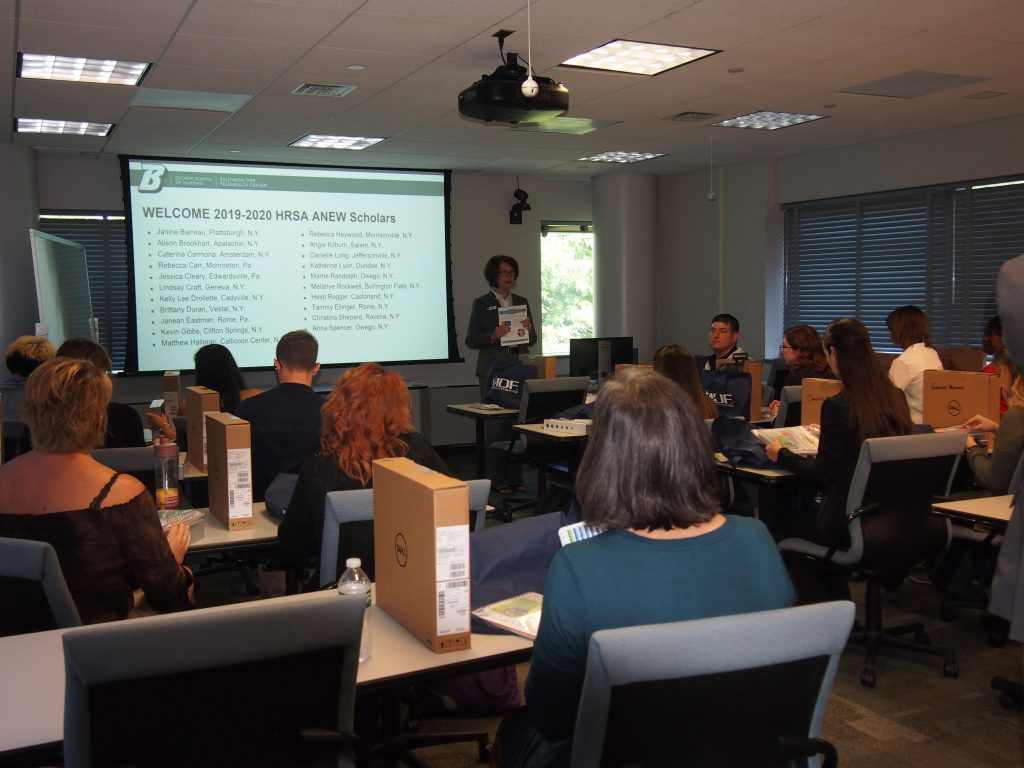
Several Decker School of Nursing students have been released from tuition- and equipment-related financial stress after receiving a multimillion-dollar grant.
On Tuesday, students participating in the Advanced Nursing Education Workforce (ANEW) program received new laptops and stethoscopes as part of a $2.8 million grant received in July from the U.S. Department of Health and Human Services (HHS).
The grant, besides being used for new technology, will also help pay tuition for 26 Decker School of Nursing students from this year and another group of 26 students in 2021. Nicole Rouhana, a co-author of the grant, director of graduate nursing and an assistant professor of nursing, said the money will help the students stay focused.
“Stethoscopes of good quality can get up to prices over $200,” Rouhana said. “By giving them access to this kind of equipment, we are able to relieve our students of as many burdens as possible so they can focus more on their studies.”
Kelly Drollette, a first-year graduate student studying nursing, wrote in an email that the grant will help replace used technology from her undergraduate years.
“Since I just finished my [bachelor’s], my current laptop and stethoscope are pretty well worn out,” Drollette wrote. “With these extra resources provided by the grant, I did not have to worry about whether or not my technology would be suitable for the program. Decker is providing me with the tools and education I need to feel confident as I step into the clinical field.”
The ANEW program grant will be divided into portions of $700,000 to be awarded each year over the course of four years. To be eligible for the award, students must come from rural areas as described by the U.S. Department of Agriculture (USDA). The program places them in rural areas upon graduation.
The USDA rural area scale reaches from one to 10, with one being a “metropolitan area core” and 10 being “rural areas,” according to their website. The grant allows students to qualify if they are from areas above a four on the scale, titled as “micropolitan area core.” Rouhana said the rules aim to promote nurses practicing in places of need.
“We want to help students reach the rural areas, which are typically underserved in this practice,” Rouhana said. “If they get involved and start their professional years in these small communities, then they are more likely to stay and buy a house and start a family there. Right now, many nurses leave after a couple years.”
For students like Drollette, staying in these communities also means being able to stay and help near home.
“I am from Cadyville. Plattsburgh is the closest town with a hospital, or any medical resources,” Drollette wrote. “Even in Plattsburgh, primary care providers are few and far in between … Plattsburgh is a small community, but it is my home. I will be able to provide to my community when I receive my degree, and I have Decker School of Nursing to thank for it.”
A focus of the HHS grant, according to Janean Eastman, a first-year graduate student studying nursing, is to practice using telemedicine. This technology aims to connect patients and practitioners through long distances to help alleviate problems in rural areas.
“Telemedicine offers a way for rural patients to access care in a new way, hopefully bridging the gap in services by bringing more options to underserved populations,” Eastman said. “As part of the program, our ANEW cohort of students will be participating in some of these telemedicine courses, further preparing us to care for underserved rural communities with new technology.”
The grant is one of three Rouhana has been a part of applying for in the Decker School of Nursing, including one for $300,000 in 2016 and another of $1.2 million in 2017.


